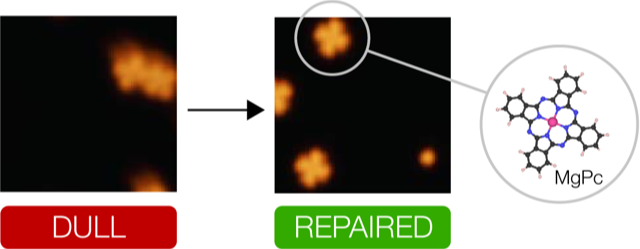
Copyright: MPI-CBG / CSBD
In the past years, Scanning Probe Microscopy (SPM) has revolutionized the fields of material, nano, and life science. The technology enables the mapping of surface properties with unprecedented precision. In a defined grid, a nanoscopically small needle scans the surface of a sample line by line. The bending or deflection of the needle tip can be measured with optical sensors and generates - similar to a digital photo - an atomically sharp image of the sample surface. The unique capability to probe real-space physical properties makes SPM one of the most powerful characterization tools for researchers. However, to obtain optimal results, the technology requires constant human supervision and intervention. For example, in manual operation, a microscopist has to constantly check the recorded images to identify adequate sample areas for scanning, or to ensure that the shape of the probe is sufficiently sharp. These demands for human supervision have so far greatly limited the application of SPM systems.
Researchers from the Center for Systems Biology Dresden (CSBD), the MPI-CBG, and the TU Dresden, together with their colleagues from the Monash University in Australia, the University of Heidelberg, and the Max-Delbrück-Center for Molecular Medicine in Berlin, have now developed DeepSPM, an Artificial Intelligence (AI) system that is capable of autonomously controlling SPM operation without the need for constant human supervision. Their method, recently published in Communications Physics, uses a combination of algorithmic approaches and machine learning and demonstrates fully autonomous, long-term SPM operation for the first time.
Alexander Krull, ELBE Postdoctoral Fellow in Florian Jug’s group at the CSBD and the MPI-CBG, and a joint first author of the study explains, “DeepSPM consistently inspects the data acquired by the microscope. High-quality images are automatically stored. When the AI detects an issue in the stream of images, it automatically sends adjusted control signals to the SPM to mitigate the problem and restore normal operation.”
The Australian-German research team developed DeepSPM to run autonomously for multiple days without any human supervision. It can continuously acquire and process data while adjusting parameters in response to varying experimental conditions. Alexander adds, “The automation of complex experimental procedures frees valuable researcher time. DeepSPM brings state-of-the-art SPM closer to a turnkey application and can enable non-expert users in labs around the world to achieve optimal performance.“
The new deep learning approach can also be generalised to other SPM techniques. The researchers have made the entire framework publicly available as open source, creating an important resource for the nanoscience research community. Fully autonomous SPM also opens the door to high-throughput and atomically precise nano-fabrication, which is hardly feasible via manual operation.
A. Krull, P. Hirsch, C. Rother, A. Schiffrin, C. Krull: "Artificial-intelligence-driven scanning probe microscopy" Communications Physics volume 3, 54 (2020), 19 March 2020.
DOI: 10.1038/s42005-020-0317-3